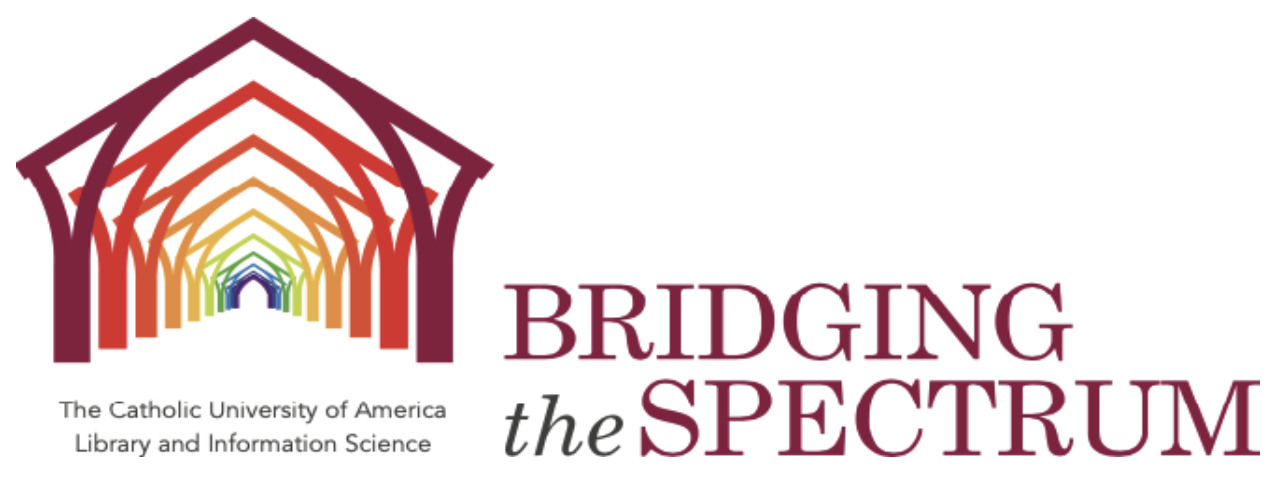"Smart Libraries: What does it mean to be smarter?"
April 12, 2023 at 10AM-Noon
Below is a recording of this year's Symposium. This and previous year's Symposiums are available on our YouTube Channel.
About the Symposium
Bridging the Spectrum: A Symposium on Scholarship and Practice in Library and Information Science offers a knowledge-sharing forum and meeting place for practitioners, students, and faculty in Library and Information Sciences and Services. Presentations are selected to showcase innovative practices, projects, and research activities in various libraries, archives, or information services activities. Because students, faculty, and practitioners all share their work, the Symposium encompasses many different aspects and points of view on library and information professional work. The program aims to foster unexpected connections across the spectrum of the information professions.
To celebrate its 15th event, 2023 Bridging the Spectrum Symposium, themed "Smart Libraries: What does it mean to be smarter?" will be hosted as a virtual panel discussion with invited panelists:
Panelist: Jeff Wisniewski, Director of Web Services & Communications, University of Pittsburgh Library System, United States
Title: The Smart Library Virtuous Cycle
Abstract: What makes a library smart? A narrow definition refers to sensing technologies' use to provide data and improve the user experience. A more expansive definition might be something like this: A smart library is a technologically modern library that uses different types of analog and digital methods to collect data. The information gained from that data is used to manage assets, resources, and services efficiently; to be forward-thinking and responsive to community needs; and to measure engagement and impact. This sets in motion a virtuous cycle that positions the library and its community for successful partnership. In a virtuous cycle, that data is used to improve operations across the library.
Panelist: Trevor Watkins, Teaching and Outreach Librarian, George Mason University Libraries, United States
Title: The Role of AI in the Future of Smart Libraries
Abstract: The future of smart libraries is closely tied to the evolution of technology and the advancement and adoption of artificial intelligence (AI). AI has the potential to transform libraries into intelligent, dynamic, efficient, and accessible institutions and revolutionize the way libraries serve their communities. In this presentation, Mr. Watkins will discuss some of the technologies commonly used is smart libraries, other technologies that are in the sandbox, and how AI can play a significant role in creating the next-generation library. Finally, the Cosmology of Artificial Intelligence, Black Squirrel GNU/Linux, and MOCA are current projects that will be briefly discussed.
Panelist: Lars Binau, Manager of Student Service, DTU (Technical University of Denmark) Media Lab, Denmark
Title: DTU SMART Library
Abstract: DTU SMART Library was initiated in 2013 in response to problems with the indoor climate in the library building. The team started thinking in terms of personal comfort and how to enhance patrons' possibilities to adjust variables affecting their perception of comfort. Comfort can be derived from various factors, such as heat, drafts, smell, light, sound, looks, people, furniture, of the feeling of security. Now SMART Library has integrated parameters including indoor living lab, data management, big data, e-science, IOT LAB, Industry 4.0 facility management, data for decision making, and sustainability.
Panelist: Battulga (Tulga) Buyannemekh, Ph.D. Candidate at the Rockefeller College of Public Affairs and Policy and Graduate Assistant of the Center for Technology in Government, University at Albany - SUNY
Title: Developing Smart Cities - The Role of Public Libraries
Abstract: Local governments worldwide have launched smart city initiatives intending to address complex socioeconomic and environmental issues. While the importance of diverse stakeholder participation in the development and governance of smart cities is recognized, the current literature tends to focus on technology firms, universities, and local governments as contributors, with less attention on community organizations like public libraries. However, emerging research suggests public libraries can play a significant role, and contribute to smart city development. This discussion builds on the research and literature on libraries as community anchors. Through case studies of three public libraries, the authors analyzed the roles that public libraries play in smart city development. Findings affirm that public libraries contribute to smart city development by: 1) developing smart citizens, 2) enabling citizen participation, and 3) providing an innovative environment. The way in which public libraries play these roles varies and is highly contextual.
Accommodations and Special Needs
Please include any disability accommodations when you register, or contact the Symposium Committee at cua-slis-symposium@cua.edu or 202-319-5085. A good-faith effort will be made to provide accommodations up until the time of the event.
Symposium Committee
Dr. Sue Yeon Syn, Dr. Sung Un Kim, and Dr. Youngok Choi
The symposium committee can be reached via email at cua-slis-symposium@cua.edu

